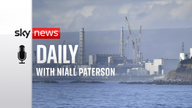Japan to start releasing treated radioactive water from Fukushima nuclear disaster into the sea
The UN's nuclear watchdog says the impact on the environment will be "negligible" but the plan has been strongly criticised by China.
Tuesday 22 August 2023 10:50, UK
Japan is set to start releasing huge amounts of treated radioactive water from the wrecked聽Fukushima nuclear power plant into the sea - despite criticism from China.聽
The Japanese government has said the move is safe and the UN's nuclear watchdog has given the plan the greenlight, saying the impact on the environment would be "negligible".
More than a million metric tonnes of water will be released. Japan says it is crucial to decommissioning the power station following the disaster more than a decade ago.
The plant was hit by a huge earthquake in 2011 that destroyed its cooling systems and caused three reactors to melt, contaminating the water and triggering continuous leaks.
By early 2024, the storage tanks which hold the leaked, treated water will reach their capacity - hence the need for a solution.
Read more:
Analysis: This has destroyed the livelihood of fishermen
But the intended release of the water - scheduled to begin on Thursday - has been criticised by other countries, including China.
Chinese foreign ministry spokesman Wang Wenbin said in July that Japan had shown selfishness and arrogance, and had not fully consulted the international community about the water release.
China bans seafood imports from 10 prefectures in Japan, including Fukushima and the capital, Tokyo. Seafood imports from other prefectures are allowed but must pass radioactivity tests and have proof they were produced outside the 10 banned prefectures.
Japan says the water will be filtered to remove most radioactive elements except for tritium, an isotope of hydrogen that is difficult to separate from water. The treated water will be diluted to well below internationally approved levels of tritium before being released into the Pacific.



